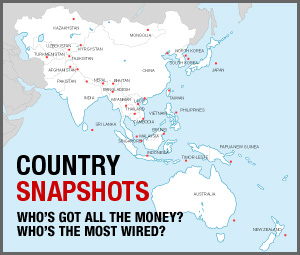The Future is Already Here
 Image: Jens Schott Knudsen
Image: Jens Schott Knudsen
Second, Chinese revisionism is not only territorial but strategic. While other great and middle powers, including past US adversaries such as Vietnam, see the preservation of the existing US-led hub-and-spokes security model as very much in their interest–and would seek only relatively minor refinements to it based on changing distributions of power–China sees it as a ready-made mechanism for its future strategic containment. Almost 20 years after the Cold War ended, the fact that almost all key states in Asia are moving closer to Washington with respect to security cooperation has not escaped Beijing. Indeed, even though Beijing, which sees itself as the natural and historic leader in Asia and America as a recent imposter, is currently free-riding under the existing security system in order to focus mainly on economic development, it nevertheless works subtly but tirelessly to undermine it.
For example, with still limited success, China has moved quickly to court American security partners experiencing temporary rifts with Washington (for example, as has occurred with the Philippines, Thailand and Japan) and emphasizes a preference for institutions that exclude the United States, such as ASEAN+3. China’s promotion of concepts such as ‘security multilateralism’ and ‘democracy between states’ is also designed to dilute the US-led hierarchical security structure in Asia by entrenching a de facto multi-polar configuration in the conduct of security affairs. In gradually reducing America’s status and role in Asia, China will increasingly attempt to isolate and ‘pick off’ smaller countries and move them into its sphere of influence. Therefore, if China continues to rise, more determined attempts will be made to circumvent, bind, dilute or transcend both American power and influence, and the San Francisco system.
Third, although China has been a tremendous beneficiary of the US-backed open, liberal order based on open sea lanes for commerce, rule of law and equal rights for states as economic actors and participants within this order, there are persistent fears that a dominant China will gradually cease to underwrite such an order. In particular, other regional states fear that a dominant China viewing itself as Asia’s Middle Kingdom is less likely to bind itself to upholding a transparent regional order where disputes are resolved by rule-of-law and pre-agreed processes. This will be especially true if China remains authoritarian, since it will be shaped by a political culture that shows little tolerance for difference and disagreement.
From China’s point of view, there is an enduring suspicion that participants within the US-backed liberal order are expected to eventually become democracies–a serious violation of authoritarian sensibilities. The perhaps plausible conviction that any US-supported institution and engagement policy seeks to ultimately democratize participants is widely held by Chinese leaders and strategists.
The Asia-Pacific in 2020
A decade from now, the Asia-Pacific might be witness to an unusual phenomenon: its most powerful Asian nation will also be one of the loneliest.
True, political and strategic influence is built on the back of economic power. And because its economic rise presents opportunities for other countries, China has made an irresistible and decisive case that it is a legitimate and economically indispensable power in Asia; that preventing China from rising economically is both unfair and self-defeating. But being accepted as a ‘legitimate’ power is one thing. Convincing other states that you ought to be trusted to lead the security order in Asia is quite another. Due to historical distrust and ongoing territorial disputes with all key Asian states, China lacks true allies and partners in Asia. Indeed, the higher China rises, the more wary other states in Asia will become.
If China continues its rise, the discussion in 2020 could well be how best to handle the strategic frustrations of an economically powerful giant meaning that even if the United States declines in relative terms, which is likely, it will for two key reasons still retain strategic primacy in Asia.
First, the United States will still be the largest economy in the world and also the most powerful military actor. Second, other regional first-rate powers such as Japan and India–who both have a wary eye on China–will take up more of the security burden, especially when it comes to naval supervision. In fact, this is already occurring.
In 2020, second-tier powers such as Vietnam, South Korea and Indonesia, meanwhile, will all have a strong interest in restricting the strategic reach and role of China. These countries will consequently use policies of balancing and bandwagoning to preserve America’s strategic primacy rather than reduce it. Indeed, the fact that the United States is not an ‘Asian power’ is to its strategic advantage because as a foreign leader it requires greater levels of acquiescence from Asian partners to retain its presence in the region (for instance, with basing rights). The same could not be said for a dominant Asian power such as China or Japan.










